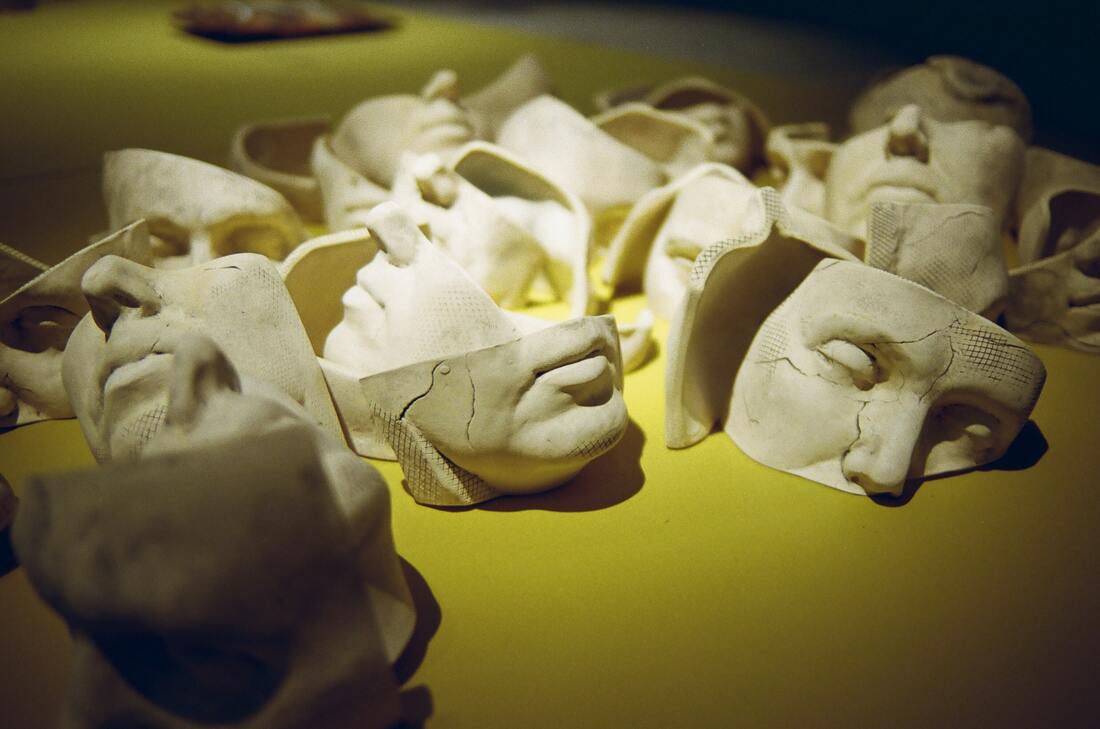CLICK HERE to listen to this week's devotional on the Walking Points Podcast, or listen to it on your favorite podcast platform. There's always extra content on the audio version that I pray will bless you. James 1:2-4 – Consider it pure joy, my brothers, whenever you face trials of many kinds, [3] because you know that the testing of your faith develops perseverance. [4] Perseverance must finish its work so that you may be mature and complete, not lacking anything. Painful Tests and Trials Several years ago, the men's study at our church studied James 1:1-12. We spent most of our time discussing our need to persevere during times of tests and trials, for this is a significant way in which God produces in us the character of Christ. It is one of God’s ordained means to help us grow into his “mature and complete” children. Most of us readily acknowledge how hard, even painful, tests and trials are. We would certainly prefer not to have to experience them. That was the testimony of many of the men who shared a little of what they had been through, or were going through, in their lives. Another Kind of Test and Trial Shortly after that lesson I had a thought one evening as I was getting ready for bed. It occurred to me that perhaps not all of our tests and trials should be categorized as painful, though they may still be considered quite hard. The ESV Study Bible says that trials are “tests” that challenge our faith. They’re designed to create spiritual maturity in us. It goes on to say that as Jesus was tested in the wilderness, so too are his followers. We know God does not tempt us to sin. Temptation seeks to lead us into disobedience and sin. Tests are used to build us up in our faith. Could this be what James meant when he used the phrase, “trials of many kinds?” Could it be God sometimes tests us even through our really good and happy circumstances as well? Suppose I had four healthy, happy, and full-of-life children. Furthermore, suppose these four children gave me great joy and nothing pleased me more than pouring my life into theirs – even sacrificially. But what if this true and right expression of love and commitment for my children went too far? What if this love for these four precious children actually began, slowly but ever so surely, to turn into idolatry? What if they became more important to me than God himself? Such love and commitment would not be good at all. In fact, such love and commitment would become sin in my life. Why? Because I would, quite literally, be putting other gods before the one true God. Could it be that God tests us through such good and positive relationships, things, circumstances, and opportunities in our lives? My Clear and Present Danger My hypothetical description regarding my four children is not hypothetical at all. I have four such children and I treasure them. I have had to, on many occasions, ask God to help me not put my children before him. In my unguarded moments, I could essentially turn them into little idols. The same could be true for all of us, whether we’re talking about our families, jobs, status, health, success, ingenuity, etc. Each of these could be little tests to determine whom we are worshipping, to see whom we love most? The Reason for Trials Why are we given trials? According to James it is to help us grow in our faith – to become more like Christ – to develop into mature and complete children of God, lacking nothing. But it’s awfully hard to become such faithfully devoted followers of Christ when we love other people or things more than we love him. It’s impossible to follow and serve God correctly when God’s not even in our top five priorities, much lesson number one. It’s little wonder that Jesus declared we cannot serve two masters. It’s no wonder he said we must seek God and his righteousness first. It’s not hard to figure out why God’s first commandment to us was that we’re to put no other gods before Him. And it’s not surprising to understand why the Apostle John’s last verse of his first epistle reads thusly, 1 John 5:21 – Dear children, keep yourselves from idols. Because of our fallenness, we have a propensity to put other people, places, things, circumstances, opportunities, feelings, emotions, thoughts, attitudes, etc., ahead of God. And anything that is in God’s place is not merely neutral – it’s an idol - an idol of the heart. Be On Guard The really good things God graciously blesses us with could be listed under James' category of “trials of many kinds.” It’s true we don’t think of them as trials. It’s also true they are not necessarily painful to go through. But it’s equally true that these sorts of trials can be gruelingly difficult, even if we’re not aware we’re going through them, or perhaps, especially if we’re not aware of it. Therefore, to increasingly mature in our faith and become more like Christ, we must realize God’s tests and trials can take many shapes and sizes. We must be vigilantly on guard. For it’s critically important for us to persevere through such tests and trials so that we “may be mature and complete, not lacking anything.” And by God’s grace, I pray it will be so for you. Walking Points
Gracious God, I give you thanks that you are good and holy and that you do not tempt us into sin. You are not the author of our sin, but righteousness. When you test us it is always to help us grow in our faith, not so we may stumble and fall. Tests and trials of various kinds are ways in which we may discover our shortcomings and weaknesses and, therefore, seek you – your wisdom, strength, and grace to persevere and grow. Please help me to endure the hard times I go through, so that by doing so you may be glorified and others may be blessed as they see you upholding me during those tough times. And yet Lord, let me also persevere in faithfulness during the good times in my life. Enable me by your Spirit to take note of your blessings in my life and give thanks to you for them without coming to love and desire them more than you. Thank you for the good gifts in my life O Lord, for they are from you. In Christ I pray. Amen.
0 Comments
The Dilemma No person fails on purpose. Yet, spiritual, and moral failures abound. A few years ago, I taught a lesson to my church’s men’s group which focused on temptations men face. The workbook we were using quoted C.S. Lewis on this subject and was a turning point for many in the group. Lewis wrote, “It does not matter how small the sins are, provided that their cumulative effect is to edge the person away from the light and out into the nothing… Indeed, the safest road to hell is the gradual one – the gentle slope, soft underfoot, without sudden turnings, without milestones, without signposts.” The truth communicated by Lewis rang true. It reminded me of something a former mentor of mine once said. He emphasized repeatedly that compromise comes through the smallness of our daily surrenders. It’s giving up that little bit of personal conviction each day. It’s the little piece of candy no one will ever know you ate. It’s watching that program or visiting that website when you are all alone. You get the picture. Usually the first surrender to “small, insignificant sins” makes it easier to fall prey to them again and again. The damage comes from the “cumulative effect” Lewis was pointing to. Few people wake up in the morning planning to sin spectacularly later in the day. Yet those daily surrenders build up over time. Give a little ground here and there and before you know it, you’re in trouble. In fact, you become practically unrecognizable, even to yourself. You didn’t plan for this to happen, but those daily surrenders were enough to do the trick. The Solution Therefore, we must be vigilant. We need to work from the foundation of knowing who we are in Christ. We need to count ourselves dead to sin and alive to God in Christ Jesus (Romans 6:11). Those “daily surrenders” needn’t reign over us. The same Spirit who raised the Lord Jesus from the dead dwells in us as well. Yet, we also need to exercise the self-awareness that recognizes those areas in our lives wherein we are weak. Every person ought to ask himself or herself: Am I being less watchful in some areas of my life than others? Even the small, seemingly insignificant areas? Am I overly confident I would never again fall prey to that particular temptation? A member of my church used to remind me often, “to be forewarned is to be forearmed.” If you want to avoid those small daily surrenders, then pray for God to deliver you from temptation. But don’t forget to do your part. Name those temptations in advance. Talk with a godly person you trust and ask them to hold you accountable. Renew your mind daily in God’s Word. The Apostle Paul shared God’s wisdom on this point when he wrote in Philippians 4:8-9, Finally, brothers, whatever is true, whatever is noble, whatever is right, whatever is pure, whatever is lovely, whatever is admirable—if anything is excellent or praiseworthy—think about such things. 9 Whatever you have learned or received or heard from me, or seen in me—put it into practice. And the God of peace will be with you. What are you thinking on? Walking Points
Merciful and patient Lord, I don’t want to sin. I don’t want to “fail on purpose.” Yet I confess to you that I have not always put in place or practiced those wise spiritual disciplines that would draw me ever closer to you and protect me from the snares of the devil and my own fleshly weaknesses. Please forgive me and renew me. As David cried out, put a right spirit within me. Give me such a desire for you that turning away from you would be the last thing on my mind. Give me greater Spirit-enabled self-discipline and self-control to practice those means of grace you have given to your children to help us conform more and more to the likeness of your Son, our Lord and Savior. For it’s in his name and for his sake I pray. Amen. James 1:8 – he is a double-minded man, unstable in all he does. How’s Your Integrity?
Let me ask you a few questions that relate to this issue of being double-minded.
Those are some pretty tough questions. And while none of us probably moves from sphere to sphere – from group to group – with perfect consistency, we still need to ask the question: How wide are the gaps? Whole, Entire, Undiminished Part, maybe even most, of that consistency will come from how “integrated” our lives are regarding our relationship with God. The words “integrated” and “integrity” come from the same root word. One of the dictionary’s definitions for integrity is, “the state of being whole, entire, or undiminished.” The double-minded man, however, is not known for their integrity, but their duplicity. Duplicity means, “deceitfulness in speech or conduct; speaking or acting in two different ways concerning the same matter with intent to deceive.” Duplicitous men do not have integrity. They are not whole, entire, or undiminished. They have no unifying factor that keeps them whole. The Unifying Factor But the Christian man does have such a unifying factor. The question is: Does he make use of it? Is he related or connected to it? This unifying factor isn’t an “it” at all. It’s God. We’re called to be God-centered men who are living God-centered lives. Such a man will not speak, think, and act differently and deceptively with different people and in different settings. Why? Because the man of God will be vitally connected to the same God in every sphere of his life. God doesn’t change. Because the godly man's life will have God as his unifying center, he will not change from place to place, from circumstance to circumstance. God-centeredness makes and keeps us whole instead of fragmented and compartmentalized. Loving and Glorifying God Think for a minute about what the Great Commandment says. Jesus says in Mark 12:30, we are commanded to, Love the Lord your God with all your heart and with all your soul and with all your mind and with all your strength.’ That’s all of our heart, soul, mind and strength. In other words, with all that we are. Our whole being. Every aspect of our lives. Paul writes in 1 Corinthians 10:31, So whether you eat or drink or whatever you do, do it all for the glory of God. You’re not glorifying God in the big or small details of your life if you’re double-minded. By the way, a good way to check yourself out on this is by asking:
God’s Expectation A couple of Old Testament texts that really hit home are,
God expects us to walk with integrity before him and others. How Are You Doing? How are you doing in the various spheres of your life? I don’t know about you but I want to be the same man in every sphere of my life: In private, at home with my family, work, church, or with my friends. I want to be the same person regardless of who I’m with or where I am. How about you? Let’s pray God will form and shape us into the God-centered men of integrity he’s called us to be. Walking Points Take a look at the list below and ask yourself how you're doing in those areas. Are you living a consistently God-centered life in each? If not, why not? What can you do today to become more consistent in the following areas?
He must also have a good reputation with outsiders, so that he will not fall into disgrace and into the devil’s trap. (1 Timothy 3:7) You have probably heard the definition of character as, “who you are when no one is looking.” You could also say that character is who you are when those who know you best are looking.
In the second chapter of The Measure of a Man, Gene Getz looks at what it takes to build a good reputation. This is rather a tricky area because some folks may enjoy a good reputation superficially because they’re able to reasonably fake it before people they don’t know well and with whom they associate only on an occasional basis. But living a life that builds a good reputation is hard to fake on a regular basis with those who know you best… such as the members of your family. Let me hasten to add that the expectation here is not perfection. As one person I recently read put it, the idea here is direction, not perfection. The question is: Are you moving in a Christlike direction in your life? Is that your intention? In our Scripture, Paul recommends to Timothy that the kind of person he should be looking for to exercise leadership in the church ought to have a good reputation. Christians are charged with hypocrisy enough as it is. And even if the charge isn’t always accurate, the mere perception can derail a life or a ministry. Worse still, we don’t want to misrepresent our Lord before a watching world. Getz suggests that Timothy was such a person… a man with a good reputation. He highlights these three indicators… 1. People were saying positive things about Timothy. 2. More than one person was saying these positive things about Timothy. 3. People in more than one location were saying these positive things about Timothy. It seems wherever Timothy was and whomever he was with, Timothy was a godly man living above reproach. Thus, he enjoyed a good reputation. Ask Someone Getz suggests that if you really want to know your reputation (as it relates to your genuine character) ask someone who knows you best. This might sting a little, but it’s a good way to get an honest and accurate perception of who you are… and it will go a long way in helping you become the godly person you want to become. Ask Yourself Just as important, we occasionally need to conduct a personal assessment of who we are and what we’re about. Getz suggests asking yourself the following questions (these are great questions, by the way) 1. Do more and more people select me as a person to share their lives with? 2. Do people trust me with confidential information? 3. Do my relationships with people grow deeper and more significant the longer they know me and the closer they get to me? Or do my friendships grow strained and shallow as people learn what I am really like? 4. Does my circle of friends grow continually wider and larger? Do an increasing number of people trust me? 5. Do people recommend me for significant or difficult tasks without fear of my letting them down? The point in all of this is not to build a reputation by duplicity and manipulation. To be sure, there are plenty of people doing that. Instead, our goal should be that as we grow in godliness, the authenticity of our increasingly Christlike character will be made evident to all. And that’s how we can represent our Lord well in this world. Ultimately, those of us who are in Christ are seeking to advance the glory of our Lord’s reputation, and not our own. But we can’t avoid the connection that our reputation will be linked to his, so let us live lives above reproach and for his praise and glory. |
Click image above to subscribe to my newsletter.
Dale TedderThanks for stopping by. Learn more about me, my ministry, and this website by clicking here. Please visit my bookstore
Click, Listen, and Subscribe to My Podcast
Updated: 2-5-24 Connect and/or Follow for more content...
The Book of Acts
Updated 2-28-24 Sermons
Updated 3-4-24 Categories
All
Click the image above to order this book and study guide about the most important person you will ever meet.
Archives
January 2024
Click image above to learn more about and order this follow-up to "Lord of All."
Listen, my son, and be wise, and set your heart on the right path: (Proverbs 23:19)
“Enter by the narrow gate. For the gate is wide and the way is easy that leads to destruction, and those who enter by it are many. For the gate is narrow and the way is hard that leads to life, and those who find it are few.
(Matthew 7:13-14) |









 RSS Feed
RSS Feed





